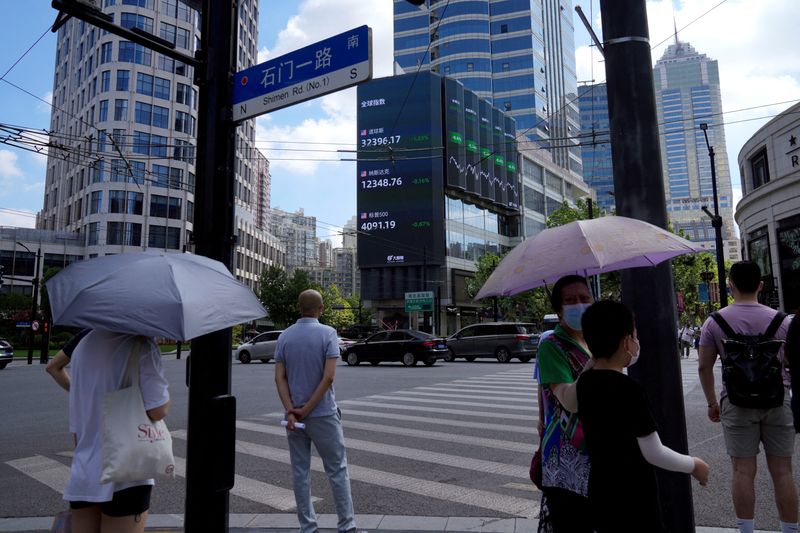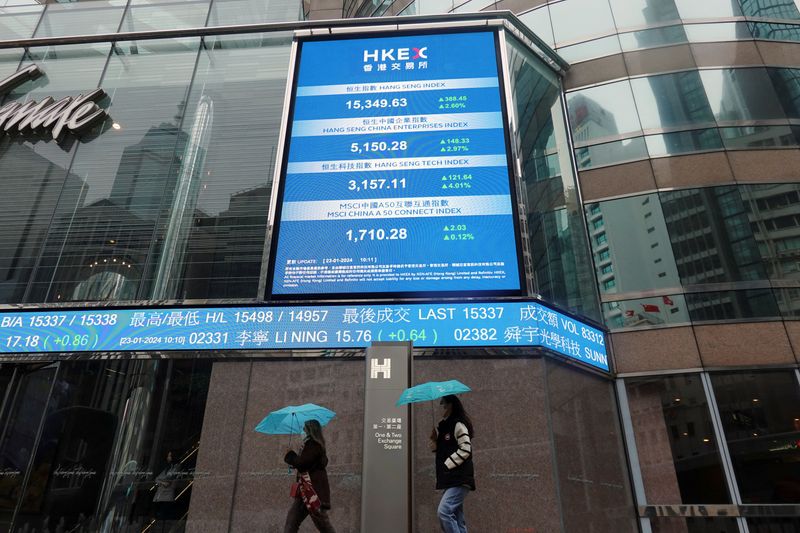By Samuel Shen and Rodrigo Campos
SHANGHAI/NEW YORK (Reuters) -From hope to hesitancy and now total capitulation, global investors in China are heading for the exits in the world's second-biggest economy and sending its stock market crashing.
Stock markets in Hong Kong and Shanghai tumbled on Monday -- the Shanghai index [.SS] marking its worst day since April 2022 -- as investors retreated from what was a 'must have' country in global portfolios just a year ago.
The selling seemed to subside on Tuesday as Chinese Premier Li Qiang chaired a cabinet meeting and Bloomberg News reported authorities were considering a package of measures to stabilise the market.
Investors were unimpressed.
"There is a degree of capitulation," said Derrick Irwin, an emerging markets portfolio manager at Allspring Global Investments. "Until there is a bigger crisis, the Chinese government may just continue to kind of throw cups of water on the fire, instead of something big that they probably need to do."
Allspring has been underweight China since last year.
This week's selloff was a culmination of months of frustration over the direction of the economy, particularly the often-opaque regulatory changes that thwarted China's post-pandemic recovery last year.
China's benchmark CSI 300 Index has slumped 47% since it peaked in February 2021, while the Hong Kong HSI stock index has sunk 49%. In contrast, Japan's Nikkei Average and the U.S. benchmark S&P 500 are up 24% each.
The Shanghai and Shenzhen exchanges have wiped out $3 trillion of value since the end of 2021.
BIG MEASURES NEEDED
Analysts at Goldman Sachs noted much of the negativity around China was priced into the stock market. But a turnaround will take time and require big policy measures, including forceful and comprehensive easing, stimulus, better Sino-U.S. relations and even government backstops in the housing and stock markets, they wrote.
Tony Roth, chief investment officer at Wilmington Trust Investment Advisors, plans to scale down his already underweight position on China due to a loss of confidence in the country’s economic activity and regulation.
"In general, our emerging markets managers are underweight China, and we are increasingly picking and working with managers that have greater underweights to China,” he said.
Any hopes that 2024 will be different were nipped early by hints from authorities that they will overlook short term hiccups as they pursue healthier, long-term growth.
Support for the battered property sector that underpins much of the economy has also been fitful, even as the Communist Party has vowed to boost oversight of the country's $61 trillion finance industry and local governments.
Marko Papic, chief strategist at the Clocktower Group, said a heavy-handed regulation of the finance sector is not what China needs now.
“After a crisis, you need banks to have animal spirits and to feel like they should lend, so if you crack down on them, it's going to slow down the recovery.”
An eagerly anticipated policy rate cut this month didn't come through, either, which Papic said showed "we're really far from any sort of a bazooka ... they're not even willing to fire a water pistol."
A 'MICRO' STORY
While investors have flocked to India, Japan and other emerging markets, some overseas money still remains in China, belonging to pension funds and others whose products are indexed to MSCI's emerging market index, of which China comprises more than 26%.
Estimates from the Institute of International Finance show a $82.2-billion outflow from China portfolios in 2023, while emerging markets excluding China saw $261.1 billion in non-resident portfolio inflows.
Dozens of exchange-traded funds also hold the country's equities.
Yet, the compulsion to own a piece of the nearly $18 trillion economy has given way to discretion, says Norman Villamin, group chief strategist at UBP, which lowered China to underweight and raised India to overweight in October.
"Over the last 30 years, the story of China has been China is growing fast, China is becoming the manufacturing center of the world. So you should just own China because the economy is doing very well," Villamin said.
Now, it is less of a 'macro story' and more a 'micro story' about owning a few good companies there, he said.
BAND-AID
Mainland investors are meanwhile unenthused by the Bloomberg News report that policymakers may mobilize about 2 trillion yuan ($278.98 billion) for a stocks stabilization fund. The Shanghai index closed below the psychologically key 2,800-point mark on Tuesday.
"It's like crying wolf," said Simon Yu, vice general manager at Panyao Asset Management. "Talks about the rescue fund have been swirling for a long time, but haven't yet materialised."
Local analysts have been calling for the set up of a rescue fund since last year.
There's precedence. A "National Team" was set up during the 2015 stock market crash, comprising a group of investors that included state fund Central Huijin, China Securities Finance Corp and investment vehicles under China's forex regulator. Their buying lifted the stock market, but just briefly.
Yu said market confidence could return if the government made it clear that it would buy stocks worth several hundred billion yuan every year.
"If there's nothing concrete, only vague rhetoric, investors expectations will remain pessimistic."
Singapore-based Daniel Tan, a portfolio manager at Grasshopper Asset Management, said the proposed amount for the fund is small "compared to the size of the problem" but could signal a change in authorities' strategy.

"We will adopt a wait-and-see approach for now. There is plenty of upside if and when the market starts to rally, we are not motivated to pick the bottom."
($1 = 7.1691 Chinese yuan renminbi)
